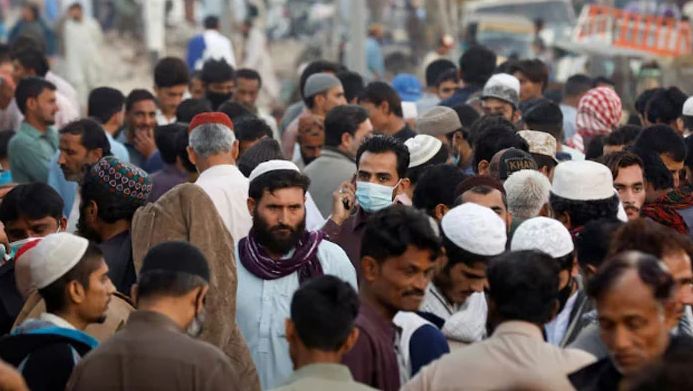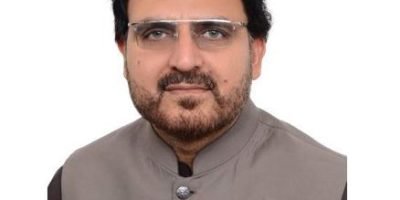A new role for men

Pakistani men wield enormous influence over many aspects of women’s lives resulting in notable power in shaping latter’s lives
By Dr Luay Shabaneh
Pakistan, a great nation brimming with resources, talent, and a vibrant history of inspiring leaders who created a great country, deserves a higher standing on the global stage. However, its current ranking on the global social indicators does not reflect that.
The country’s position at 137th on the Sustainable Development Index (SDI) and 134th on the Social Progress Index (SPI) – encompassing 57 indicators across basic needs, well-being, and opportunity – is a stark contrast to its potential. Pakistan is also placed at the fifth tier of low social progress countries, penultimate on the gender parity index, and ranked among the five least performing countries along with Afghanistan on the Global Gender Gap Index (GGGI) which evaluates education, health, and economics. The country deserves better social progress.
UN Secretary-General Antonio Guterres has emphasised that Sustainable Development Goals (SDGs) cannot be achieved without gender equality. Therefore, Pakistan will not be able to improve its global indices unless women and girls enjoy their rights to education, economic opportunities and healthcare including reproductive health.
Pakistani men wield enormous influence over many aspects of women’s lives; they hold positions of power including the top leaders and ministers, religious leaders, judges, and tribal leaders. This dominance grants them considerable power in shaping women’s lives, they design and implement policies that affect women’s lives and well-being. Currently, one in three women in Pakistan experiences gender-based violence, a phenomenon often rooted in deep-seated social norms that perpetuate male dominance.
Paradoxically, these same norms also leave men uninformed and unsupported when it comes to addressing their own sexual and reproductive health issues – creating a critical gap that hinders progress on gender equality and overall social well-being. This dichotomy plays out in various spheres of life. At the community level, women’s lives are a private affair, yet they are judged as a public affair according to social norms. Within families, men’s actions or decisions profoundly impact women’s status, achievements, and reproductive life.
Recognising this dynamic, many development practitioners advocate for engaging men as agents of change in empowering women. In this vein, Executive Director of UNFPA Dr Natalia Kanem aptly emphasises that the mindset needs to shift, power dynamics need to change and for this to happen, men and boys need to be part of the solution, not merely be passive bystanders. However, to be a game-changer men and boys themselves need to have greater awareness and wellbeing.
In Pakistan, husbands play a dominant role in their wives’ health and well-being, particularly during pregnancy, childbirth, the postpartum period, and decisions related to family planning. Empirical research suggests that men can be powerful allies in promoting women’s well-being if they are allowed to better understand women’s sexual and reproductive health (SRH) issues, interact positively, and offer support. However, for men to play this role, it is crucial that they first understand their own SRH matters and have access to relevant health services. Men’s reproductive health is rarely discussed in public or development contexts.
In male-dominated societies like Pakistan, the prevailing narrative assumes that men are inherently sexually healthy, as any sexual illness is seen as undermining their manhood and superiority in the power dynamics of sexual relationships. As a result, men often adhere to stereotypical behaviours where they are expected to not show emotions, not respond to pain, and avoid seeking medical support. In many cases, they place the blame on their wives for dysfunctional sexual relationships, particularly in the early years of marriage. This dysfunctionality often impacts the mental health of men and boys. Seeking psychosocial help and counseling for these issues is also considered taboo, which leads to increased aggression among men.
Additionally, families frequently put social pressure on women regarding infertility but seldom speak openly to men. In response to this pressure, women may resort to exaggerated medical intake and expose themselves to unreliable and sometimes unsafe treatments by quack practitioners and charlatans, driven by the fear of polygamy or divorce. This puts their reproductive and mental health at significant risk.
There is a widespread lack of awareness around men’s sexual health issues. Men are not only transmitters of sexually transmitted infections (STIs) including HIV but are also vulnerable to depression due to sexual dysfunctionality which in turn impacts the well-being of women and children, severely impairing family health and stability. Often, these issues are intertwined with a high prevalence of gender-based violence (GBV).
Men’s sexual health is a vital yet neglected aspect of community health. Sexual dysfunction in men can increase the likelihood of Intimate Partner Violence (IPV) through the mechanisms of masculine discrepancy – stress and anger. In older ages, it is recommended that men undergo regular checkups for sexual health risks such as prostate cancer, particularly after the age of 55.
In Pakistan, prevailing social norms often overlook the significant role men can play in improving maternal and postpartum health, reducing infant mortality, and alleviating maternal stress. Redefining these roles is essential for addressing broader health and gender equity challenges. While men are often viewed as perpetrators of gender-based violence (GBV), there is a growing global recognition of men as victims, particularly in cases of sexual violence faced by young boys and adolescents.
In many parts of the world, including Pakistan, societal norms around masculinity discourage vulnerability and victimhood. The lack of services tailored to male victims further discourages them from coming forward. While this recognition of men and young boys as victims of GBV is becoming more widespread in Western countries, it is also slowly gaining attention in Asia, particularly in countries like India and South Korea. There, domestic violence against men and sexual abuse of adolescents are beginning to be acknowledged in legal frameworks, though significant cultural barriers remain.
The role of men and boys is crucial for making a breakthrough in women’s status and consequently improving Pakistan’s overall ranking on global social indices. A genuine shift in men’s role, from dominating to supporting women, is vital for both families and communities. Men must be educated about women’s rights and their role in the positive gains they get when their partner woman is strong, protected and able to enjoy her rights.
Pakistan needs a transformative counter-narrative on men’s sexual and reproductive health – one that redefines traditional views of masculinity often centred around narrow notions of dominance and sexuality and instead promotes a broader vision of support, protection, and respect for women’s rights. This shift necessitates not only public dialogue but also targeted services and policies that actively engage men as allies in advancing gender equality.
The writer is the UNFPA representative in Pakistan.
Related News

Authority, Celebration and the Moral Challenge of Ramadan
by Muhammad Mohsin Iqbal The state, in its ideal moral conception, resembles a mother—protective yetRead More



Comments are Closed